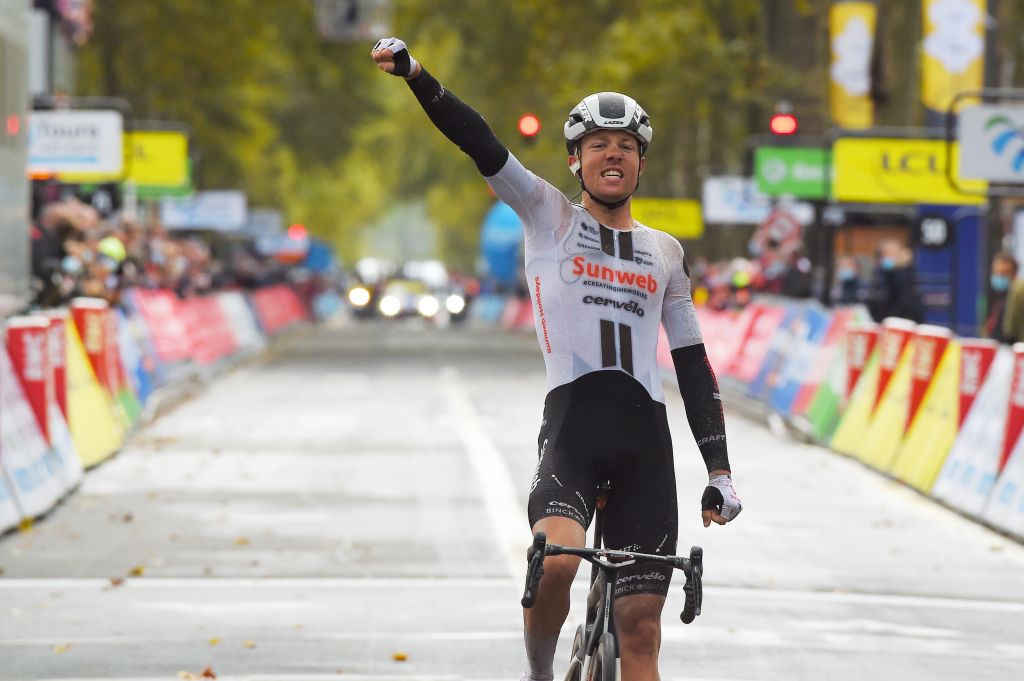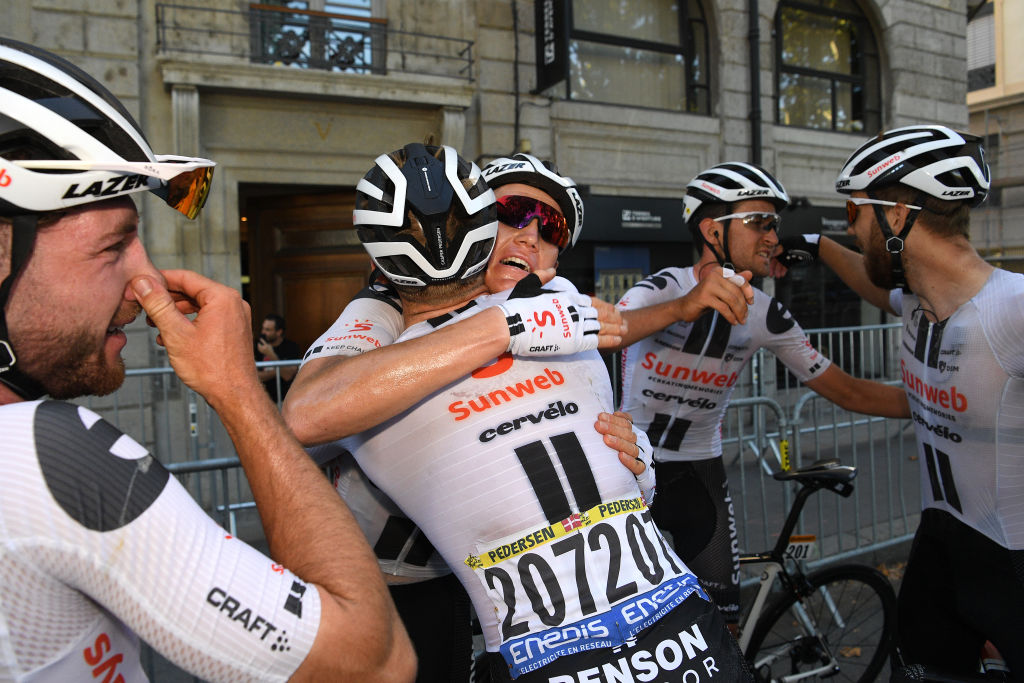Casper Pedersen: I watch videos of Morkov to become a better lead-out man
Dane on his 'breakthrough' season, Classics ambitions, and Sunweb's team spirit

In his third season as a professional, and his second at Team Sunweb, Casper Pedersen had something of a breakthrough year in 2020. The 24-year-old Dane won his first major race at Paris-Tours, as well as shining as part of Cees Bol's lead-out train on his Tour de France debut.
The season ended on a sour note, as he crashed out of Scheldeprijs and was robbed of a Tour of Flanders appearance but he was able to reflect on a great campaign and set his sights on bigger and better things as one of the riders to watch in 2021.
Speaking to Cyclingnews over the off-season, Pedersen discusses his twin ambitions of becoming a top lead-out man and a Classics contender, as well as the team spirit at Sunweb - soon to be known as Team DSM - which is helping the team punch above their weight and helping him fulfill his potential.
Cyclingnews: First of all, how are you? And how have you recovered from the concussion that ended your season at Scheldeprijs?
Casper Pedersen: I’m fine. It was only a mild concussion. You never know at first with concussion but I only had to lie in bed for a few days then I could start doing normal stuff. I took my off-season, had a really good recovery, and everything has been going to plan since that and I’ve been able to start training properly now.
CN: What was your feeling at the end of the season?
CP: It was strange, winning Paris-Tours then four days later crashing out of Scheldeprijs just before one of the biggest races at Flanders. I was super happy and on a high, and I could feel I was in really good shape. I’d been developing my abilities throughout the season, so it was kind of mixed feelings, winning Paris-Tours and having my breakthrough in a way, then not being able to do Flanders.
Get The Leadout Newsletter
The latest race content, interviews, features, reviews and expert buying guides, direct to your inbox!
CN: What about the season as a whole?
CP: The season, taking it all into consideration, with lockdown and everything, ended up being a really successful one for me. Just going to the Tour was a big surprise to me in the first place, so that was a big acknowledgement from the team that they trusted in my abilities. Being able to do a few really good lead-outs and learning a lot, that was a big success for me.
I achieved a lot of my goals this season, which was developing my Classics skills and working towards becoming one of the best lead-out guys in the peloton. I'm continuously working towards being one of those guys who are acknowledged as being one of the best lead-out guys out there. That’s my focus point, but I also have my own ambitions, and want to win races myself.
CN: Do you want to win sprints yourself one day?
CP: I’ve kind of considered it sometimes - maybe I could be a sprinter myself - but I just don’t think physically it’s the right fit. I don’t see myself being able to be up there with the top top sprinters who are heavier and more explosive than me. I’m not that guy who is 85kg of pure muscle who can do 1800 watts. I’m more like a track speed kind of guy, I’m 70kg, and can more go at a high speed for a long time, which is optimal for leading out a sprinter who can deliver the last kick.
I want to do something where I can excel, and really be one of the guys to deliver something big. I’ve seen I’ll be better as a lead-out man, especially working with one of the biggest sprint talents, who can make me become part of some big victories.
CN: I presume you’re talking about Cees Bol. He didn’t get a win at the Tour but the underdog Sunweb lead-out earned a lot of praise. What was the secret there?
CP: The reason it went so well was we really studied how to do a proper lead-out and studied all the small details that have to be in place: timing, positioning, communication, pacing. We really practised those details and studied videos from other races. Also, I personally studied other lead-out guys, how they set things up, and how they get to the sprint in the easiest way, because that’s the essence of it - to bring your sprinter to the 200m mark as easy as possible.
It’s also a lot about trusting each other and we really tried to build up that trust. When one guy takes a decision, we don’t have time to discuss it, we only have time to trust and follow, then we can evaluate afterwards. That way of working was something we really developed over lockdown.

CN: When it comes to studying other lead-out men, whose name do you type into YouTube?
CP: Actually, for me, I’ve been studding Michael Morkov a lot. I know him a bit personally, and it’s quite obvious he’s superb in doing lead-outs. I’ve definitely learnt a lot from him and I still can learn a lot from him. If you want to be the best, you have to be able to beat the best. If I can do the same as him, I’m in a better position to beat him in the same role.
CN: What do you see in those videos of Morkov? What is it that makes him so good?
CP: It can seem so easy when he does it, but it’s actually super complex what he’s doing. He’s just so calm in the bunch, he knows exactly where to be, he knows all the other wheels of all the other riders, and their abilities, so he knows when there’s a good train to jump on. He knows how to pace it exactly, and he knows his sprinter - how he’s feeling and exactly how he wants it to be. In the end, he’s 11 years older than me so has had more time to perfect it. It’s a lot about experience and picking that up along the way but you can also speed up that process by watching your opponents.
CN: Morkov track prowess is often cited as a key lead-out skill. You’ve got some track background but are you still doing any of that?
CP: I’m not doing any track anymore. I did one race last spring, but that was it. I sometimes I miss it but it’s also hard to combine because the Danish team on the track are fully serious, so it’s a full commitment to be on the Danish national track team. I chose my way and focused fully on the road.
CN: Moving onto your own ambitions of victory, what are your hopes for the Classics after that breakthrough?
CP: I really hope I can be there in finals next season. I’ve already gathered a lot of experience - I know what I’m getting myself into and I know the roads and how to race them better - so the next step is to build up my endurance enough to be able to ride the finals after 200km. Of course, I dream of being on the podium of big Classics like Flanders but you have to take one step at a time, and the next step is just to be riding some the finals.
CN: Which suits you better - Flanders or Paris-Roubaix?
CP: I’d definitely say Flanders and the races like that. It mainly comes down to my body composition. I’m not so heavy, and in Roubaix it’s actually quite a big plus if you’re more than 80kg, whereas in Flanders there’s still a lot of climbing where it’s pretty good to not be super heavy. I definitely prefer the hillier cobbled Classics.
CN: At DSM you’re part of a strong team for those races, with Tiesj Benoot and Soren Kragh Andersen…
CP: Definitely, and also Nils Eekhoff and Cees can do real good Classics races. We have a young group of riders that have talent to develop and be better and better. It’s exciting to be part of a team in development, and I hope we can soon be riding more finals with more riders.
CN: What do you need to do to take that next step, firstly in terms of being a better lead-out man and then in terms of becoming a Classics contender?
CP: Actually, looking back at this year, it’s just about following the process I’m already in, and trusting the experts we have in the team. For now it’s about continuing something that works, because we saw our team had a lot of success this year and we were one of the youngest WorldTour teams. To change a lot of things wouldn’t be clever, so it's about continuing to work on those workshops where we look at sprints, and also on the relationship with other riders. Beyond that, it’s also completely down to the basics: training really well and building my engine bigger. We’re in a really good position with the tactical and mental part of it, so when my physical abilities increase I can achieve those goals I have.
CN: Finally, does it help to look at someone like Soren Kragh Andersen, who’s a compatriot, teammate and has had a similar career trajectory. He’s two years older than you and won Paris-Tours two years ago and has now won two stages in the Tour de France.
CP: Definitely. He’s a really good teammate and he’s also inspiring in the way he’s working. He’s a really serious guy and can really go into this focus where he’s just training perfectly, eating perfectly, sleeping perfectly. He’s a motivating rider to be teammates with, because I can kind of reflect myself a bit in the way his carer has gone, already going to Sunweb at an early point and slowly developing into the rider he is today.
Seeing him win two stages in the Tour gives some motivation when you look at yourself, because when you’re working with the guy every day, you also think ‘ok maybe I can also do it at some point’. It’s really a driving motivation to see one of your teammates and friends go out and actually achieve it - that gives you belief that it’s not just a dream, but actually possible.
Patrick is a freelance sports writer and editor. He’s an NCTJ-accredited journalist with a bachelor’s degree in modern languages (French and Spanish). Patrick worked full-time at Cyclingnews for eight years between 2015 and 2023, latterly as Deputy Editor.
